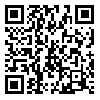BibTeX | RIS | EndNote | Medlars | ProCite | Reference Manager | RefWorks
Send citation to:
URL: http://yafte.lums.ac.ir/article-1-2212-en.html
Background: The first step in improving research conduction in society can be conceived as identifying the weak points of research. Given that faculty members of universities carry out most of the research activities, the present study attempts to study the relationship between barriers to research from the viewpoint of the faculty members of Lorestan University of Medical Sciences and the research activities of them.
Materials and Methods: This cross-sectional study, using census method, assessed all of the faculty members of Lorestan university of medical sciences. A self-administered questionnaire analyzing the faculty members’ demographic variables, knowledge about and attitudes toward barriers to different steps of research was designed and the self-report questionnaires were filled out and their relationship with the annual assessment scores in research criteria were assessed by chi-square, Mann-Whitney and Kruskal-Wallis tests.
Results: Variables such as the faculty members’ department, number of their modules, primary motivation for research conduction, knowledge about variables such as research methodologies, searching strategies in medical databases, putting forward proposals, research article writing and also, attitude towards vaiables such as approved research priorities, putting forward proposals, quality of research advice, approval of proposals in research councils, research facilities, the process of peer review of national scientific articles, presenting papers in conferences and participating in theses were related to the research performance of them (p<0.05).
Conclusion: If seems that giving special privileges to the faculty members of faculty of medicine, those with many modules and those with no optimal knowledge and attitude, we can enhance their motivation to participate in research activities.
Received: 2016/05/15 | Accepted: 2016/05/15 | Published: 2016/05/15
| Rights and permissions | |
 |
This work is licensed under a Creative Commons Attribution-NonCommercial 4.0 International License. |





